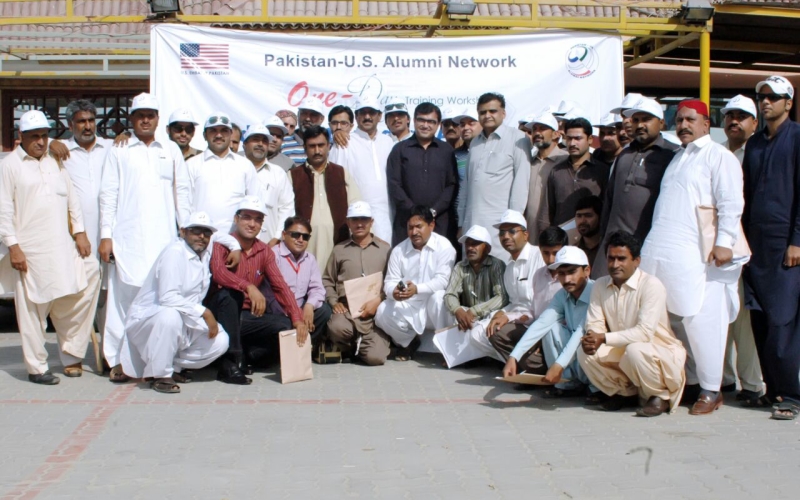By Rimsha Ali Shah
Being a reporter in Pakistan, the fourth deadliest country for journalists according to a report by International Federation of Journalists, Safdar Sahito understood that while access to free expression was a fundamental right, practicing safe preventive measures in the field was equally significant.
This is why he enrolled in the training workshop organized under the theme “Media Safety under Securing Access to Free Expression (SAFE) Initiative.” As the Chairman of the Gambat Union of Journalists, he was aware of how pivotal such a training was for journalists in the present reporting scenario.
“Such training programs enhance the capacity of the local journalists to face the security and safety issues during reporting,” he added.
The sessions held in Gambat, District Khairpur; Moro, District Naushero Feroz; and Nawabshah, District Shaheed Benazirabad in Sukkur were the brainchild of International Visitors Leadership Program (IVLP) alumnus Sahib Khan Bhand. In 2014, he attended the IVLP on “Activism through Social Media” and since his return, he has focused on media-centric projects for local journalists in Sukkur. In April 2016, he initiated a district-wise training program “Media Safety under SAFE Initiative” to train 120 local journalists in Sukkur. This was made possible with the help of an alumni small grant from the Pakistan-U.S. Alumni Network (PUAN). All alumni of various U.S. government-sponsored exchange programs in Pakistan are eligible to apply for the grant of up to $5,000 USD to enable them to give back to their communities.
Workshops Cover All Aspects of Media Safety
From April 10 – 24, 2016, 120 journalists were trained on different aspects of media safety including digital safety, best practices for crises reporting, risk analysis, preventive measures, self-defense training and briefed on the legal protections present for journalists in Pakistan.

Brainstorming session on risks faced by journalists in Sindh
Through brainstorming sessions on risk assessment and video tutorials, participants learned about safety measures for varying circumstances, including reporting during a natural calamity and a conflict.
While discussing neutral and unbiased reporting as a preventive measure for journalists reporting on sensitive beats, Mr. Ali Akbar Hingorjo, Senior Producer, Radio Pakistan Hyderabad said, “Sometimes imbalanced news content raises the security risks for the journalists.”

Safety training by Police in Nawabshah
In all three districts, chief nstructors of Police Training Center (PTC) attended the workshops and shared self-defense exercises with the participants, along with stressing the need for following security protocols during a conflict. “While reporting on sensitive issues, journalists need training like police personnel to understand the sensitivity of the incidents and protect themselves,” said Mr. Atta Muhamamd Khand, Chief Instructor Sub-Inspector at Commando Police Training Center Naasri, Sakrand.
The training not only highlighted on-ground preventive security measures but also took in into consideration the digital environment and its security hazards. “Digital Security is equally important as physical security,” said Imtiaz Hussain from The News International, Sukkur. Through his training on digital security, he highlighted the changing landscape of reporting and resulting safety practices for digital media.
Establishment of Safety Resource Centers Promotes Collaborative Efforts
With the conclusion of each training, a focal person was appointed to carry forward the formation of a “Safety Resource Center”. These centers will serve as a go-to resource point for updated security and safety measures for journalists.
To ensure that the best practices reach out to the wider network, the participants also initiated a WhatsApp group to continue sharing best practices for access to free expression while practicing safety measures.

Project lead, IVLP alumnus Sahib Khan
Dr. Bashir Memon, Associate Professor at Department of Media Studies at the University of Sindh, Jamshoro endorsed the training as the right step towards ensuring the protection of journalists. Mr. Manzoor Bughio, President, Press Club Nawabshah, believed closed group communication on social media and messaging applications, access to assistance could be increased.
Through these two measures, the project continues to thrive with key learnings continuously being spread out to the larger journalist fraternity in Sindh and beyond. Projects such as “Media Safety for Journalists under SAFE Initiative” are a testament to the commitment of our alumni towards capacity building and empowerment of local communities.

